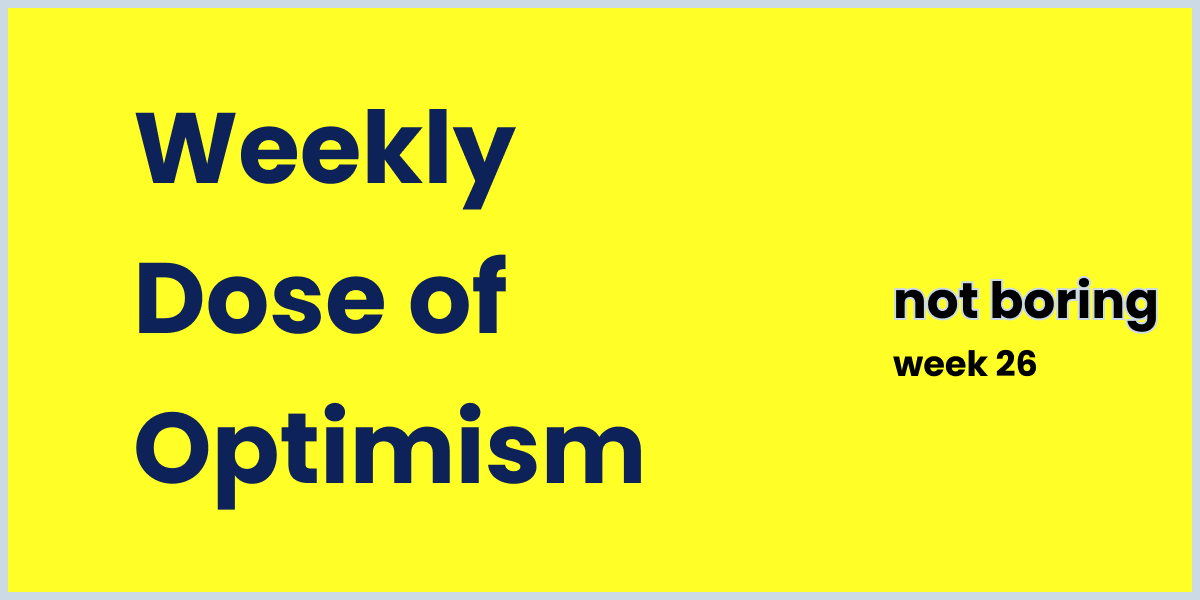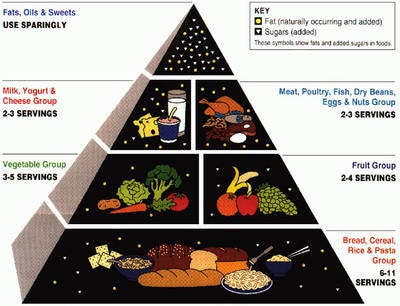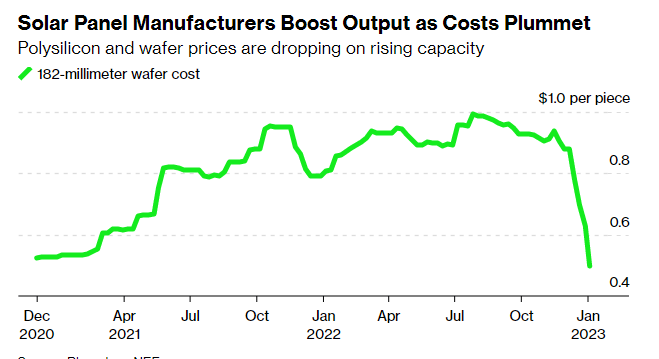

Weekly Dose of Optimism #26
source link: https://www.notboring.co/p/weekly-dose-of-optimism-26
Go to the source link to view the article. You can view the picture content, updated content and better typesetting reading experience. If the link is broken, please click the button below to view the snapshot at that time.

Weekly Dose of Optimism #26
RSV Vaccine, Obesity and Diet, Solar Plunge, Rise of Steel, Recession Startups, OFP on NBF
Hi friends 👋,
Happy Friday and welcome back to our 26th Weekly Dose of Optimism. We’re starting to get back into the swing of things, and hope you are too.
Let’s get to it.
The Weekly Dose is brought to you by… Sprig
Sprig is the easiest way to collect product feedback, inform product decisions, and increase your speed of innovation. The world’s best product teams including the teams at Notion, Loom, and Robinhood use Sprig’s in-app surveys and concept and usability tests to capture insights from their customers and build better products.
This week, Sprig announced integrations with 12 of your favorite prototyping tools including Figma, InVision, and Adobe XD. With just one click you can drop your prototype link from your favorite design tool into Sprig and capture actionable user insights.
Here’s what I love about Sprig:
It’s incredibly fast to source participants and launch a concept test
The UX is clean and simple, consumer-grade, and they have 75 templates which makes getting started so easy
As a dashboard junkie, I love watching the results and AI-driven insights roll in in real-time, even, and especially, when the feedback is harsh!
We actually almost stopped publishing this newsletter after edition #11 until we ran a Sprig Survey and discovered that 95% of you enjoyed reading it…so you can thank Sprig for the Weekly Dose of Optimism!
(1) Moderna says RSV vaccine is 84% effective at preventing disease in older adults
Spencer Kimball for CNBC
The vaccine was 83.7% effective at preventing lower respiratory tract disease, defined as two or more symptoms, in people ages 60 and older, according to the Boston biotech company…No safety concerns have been identified during the clinical trial of the vaccine, according to Moderna. ..Moderna said it plans to file an application for approval by the Food and Drug Administration in the first half of this year. There currently is no FDA-approved vaccine for RSV.
mRNA vaccines are a modern wonder.
I’d never given much thought to RSV until last year. A common respiratory virus, the symptoms are usually mild. But then a wave of cases swept our kid-filled neighborhood. Dev caught it and ended up in the hospital. Then Maya caught a less severe case. Now, RSV is another respiratory virus we need to worry about on top of COVID, and every time we’re around another kid who sneezes or coughs, we go on high alert.
Just a few months later, however, it seems like we have a relatively effective vaccine for treating RSV, at least in older adults. In clinical trial data released earlier this week, the new RSV mRNA vaccine from Moderna was ~84% effective at preventing diseases in older adults and presented no safety concerns. Hopefully a vaccine for kids is on the way.
The speed of mRNA vaccines is dizzying — new scary virus one month, new vaccine a few months later. The technology is a big W for humans. Stay tuned next week for a deep dive on a company keeping the RNA-based medicine momentum rolling 👀.
-Packy
(2) 🎧 How Americans Got Everything About Food—Fat, Sugar, and Obesity—“Entirely Backwards” 🎧
Derek Thompson for Plain English
Dr. David Ludwig, an endocrinologist who has researched and written on obesity and diet. He explains why scientists still haven’t arrived at a consensus on obesity, why he thinks the conventional wisdom about calories and fat is wrong, what he thinks is really going on, and why the history of diet advice has been so wrong in the last half century.
At this point, it’s become popular to point out just how backwards the 90s-era, government-backed food pyramid was. Breads, cereals, rices, and pastas as the foundation of the American diet…of course there’s an obesity epidemic!
With something this complex, however, there’s a great deal more nuance. In fact, decades later, there is still no scientific consensus on the topics of obesity and optimal nutrition.
Dr. David Ludwig joined friend-of-the-newsletter, Derek Thompson, to discuss his theories on obesity in America. Simply put: he doesn’t blame over-eating, but rather, a flood of processed, fast-digesting carbohydrates…you know, the ones at the bottom of that 90’s pyramid.
(3) Big Solar Panel Manufacturers Boost Production as Costs Fall
From Bloomberg News
Several big solar-panel makers are ramping up production in a boon to clean energy. A key reason: the collapse of material costs that had been elevated for more than a year.
It seems like we write about the decreasing costs of solar energy every week. There’s good reason, too: solar kWh decreased from $0.42 in 2009 to $0.05 in 2021 — that’s nearly a 90% cost reduction in just over a decade. That massive cost decline, at least over the last few years, has been in spite of elevated panel material costs.
But now even that headwind seems to be subsiding. During 2021 and 2022, there was a shortage of polysilicon - a key material in most solar panels. However, during the end of 2022 and beginning of 2023, several new Chinese factories have come online, increasing total wafer capacity and plummeting the cost since November.
This means it’s cheaper to produce solar panels, which all else equal, means more deployed solar panels, which in turn again drives down the cost per kWh. Learning curves are a hell of a drug.
Brian Potter for Construction Physics
Speaking of learning curves: Brian Potter of Construction Physics dropped an in-depth historical analysis of the rise of steel around the turn of the 20th century. Steel enabled the Industrial Revolution in America — and that revolution was powered by both an exponential increase in output capacity and subsequent decrease in steel prices. Cities, buildings, railroads, bridges, factories — all enabled by steel.
It’s tempting to predict “x” is the steel of this new “y” revolution — I’ve probably seen a dozen LinkedIn posts making such claims about generative AI. But let’s not discount just how important steel was (and is) in building the world around us.
(5) Why to Start a Startup in a Bad Economy
by Paul Graham, October 2008
So maybe a recession is a good time to start a startup. It's hard to say whether advantages like lack of competition outweigh disadvantages like reluctant investors. But it doesn't matter much either way. It's the people that matter. And for a given set of people working on a given technology, the time to act is always now.
An oldie, but a timely goodie from PG that, for whatever reason, happened to resurface as the #1 article on Hacker News on Wednesday. It now almost seems cliché to remind folks that “the best startups are built during a recession,” but when PG wrote it in 2008 it was (maybe) less obvious. Sure, at the time, there were seasoned investors who had lived through the dotcom and early 90s recessions that read the essay and thought “of course.” But PG called his shot — Airbnb, Uber, Slack, WhatsApp, Square, Instagram, Pinterest (among many others) were all started between 2008 - 2010.
You likely already know that story. But the tricky part is not knowing the story, it’s actually acting against it. Hopefully this is a helpful reminder.
Bonus: Not Boring Founders: Michael Kelly, Open Forest Protocol
We had on Michael Kelly, the co-founder of Open Forest Protocol on Not Boring Founders. Open Forest Protocol (OFP) is a scalable open platform that allows forest projects of any size, from around world, to Measure, Report, and Verify (MRV) their forestation data in order to fund reforestation and afforestation projects. It’s a prime example of web3 tools being used to solve real-world problems.
Did you enjoy reading this Weekly Dose of Optimism?
(Powered by Sprig)
That’s all for this week. We’ll be back in your inbox on Wednesday.
Thanks for reading,
Recommend
About Joyk
Aggregate valuable and interesting links.
Joyk means Joy of geeK





